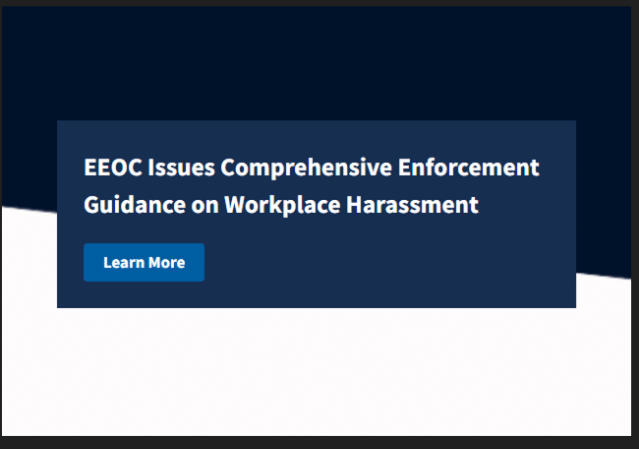New EEOC Guidelines Force Employers to Allow Men in Women’s Bathrooms, Prohibit “Misgendering”

First they came for the schools, now they’re coming for businesses. The Biden administration’s campaign to prioritize transgender rights for students under Title IX has moved on to the workplace via newly expanded Title VII protections for employees. And once again, women—the people both laws were meant to protect—will pay the price.
Late last month, the Equal Employment Opportunity Commission (EEOC) released new guidelines that broaden the definition of workplace discrimination to include harassment based on “gender identity.”
Under the updated federal guidance, employers who misgender employees (i.e., refer to them with a pronoun inconsistent with their known gender identity) or deny them access to restrooms based on their gender identity are liable for sex-based workplace harrasment.
The guidelines state that they’re “not binding on the public in any way.” But that disclaimer is “worth little,” says Commissioner Andrea Lucas, one of the two dissenters who voted against adopting them. Employers now know where the enforcement agency stands, and they’re going to do what it takes to avoid liability.
That means working women will be sharing the ladies’ room with men, putting them at risk for exactly the kind of sexual harassment (or worse) Title VII was meant to protect them from.
It’s a perverse result, Lucas says:
Women’s sex-based rights in the workplace are under attack—and from the EEOC, the very federal agency charged with protecting women from sexual harassment and sex-based discrimination at work….The Commission’s guidance turns anti-harassment principles completely upside down. Under the Commission’s pronouncement, a company denying biological males access to its women’s workplace bathroom, shower, locker or dressing room, or sleeping facilities no longer is exercising reasonable care to prevent harassment of female workers. To the contrary, taking this reasonable and necessary step to protect women now is deemed evidence of harassment against any biological male who self-identifies as having a female “gender identity.”
The Commission says it’s just bringing its guidelines up to speed since they were last revised 25 years ago. They now reflect the Supreme Court’s 2020 landmark decision in Bostock v. Clayton County, where the Court held that an employer who fires an employee “simply for being … transgender” violates Title VII’s ban on sex discrimination.
Not so fast, critics say. Bostock was a narrow ruling, they argue, and the Commission exceeded its scope.
Well, here’s what the Court said in Bostock:
The employers worry that our decision will sweep beyond Title VII to other federal or state laws that prohibit sex discrimination. … [U]nder Title VII itself, they say sex-segregated bathrooms, locker rooms, and dress codes will prove unsustainable after our decision today. But … we do not purport to address bathrooms, locker rooms, or anything else of the kind.The only question before us is whether an employer who fires someone simply for being homosexual or transgender has discharged or otherwise discriminated against that individual “because of such individual’s sex.” … Whether other policies and practices might or might not qualify as unlawful discrimination or find justifications under other provisions of Title VII are questions for future cases, not these.
That’s on the one hand.
On the other, the Court didn’t close the door on those “policies and practices” either: it left it open, by saying that whether they qualified as workplace discrimination was a question for another day.
And since Bostock, federal courts have marched right through that door. Footnote 37 to the guidelines collects their decisions, all relying on Bostock to find that transgender-identity-based harassment is sex discrimination under Title VII.
Nonetheless, 20 states Attorneys General argue the Commission is taking the Supreme Court ruling too far. Bostock doesn’t license the EEOC to require allowing male workers into female co-workers’ bathrooms, they wrote in a letter last November responding to the proposed guidelines.
Nor does Bostock mandate that employers adopt their transgender employees’ preferred pronouns. That amounts to a regulation of pure speech, they say in the letter.
Meanwhile, in lawsuits over Biden’s revamped Title IX, 15 states and several conservative groups are making very similar arguments, the Epoch Times reports. “The U.S. Department of Education has no authority to let boys into girls’ locker rooms,” Tennessee Attorney General Jonathan Skrmetti said in a statement on the Title IX complaint his office filed together with four other states.
Skrmetti also led the coalition of states objecting to the proposed EEOC guidelines last November. The “EEOC’s Title VII stance will unleash unconstitutional chaos in the Nation’s workplaces,” he said:
The EEOC has once again proposed enforcement guidance that extends beyond its statutory authority and threatens the First Amendment rights of millions of Americans. … Tennessee has successfully challenged EEOC’s unlawful guidance in the past and stands ready to do so again.Should the EEOC decline [to revise its proposal], Tennessee and the other co-signing states are prepared to pursue appropriate legal action to protect their interests, affected employers, and the democratic process.
If last week’s Title IX lawsuits are any indication, that legal action could be coming very soon.
CLICK HERE FOR FULL VERSION OF THIS STORY
